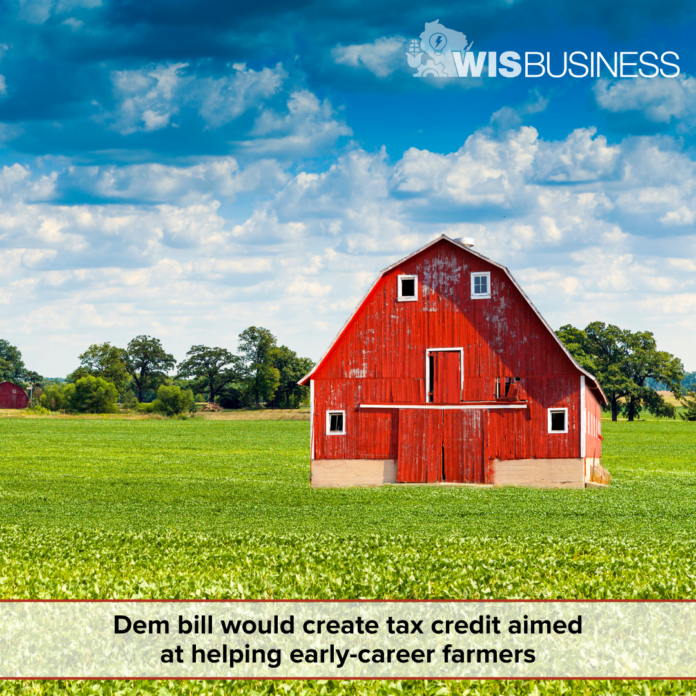Dem lawmakers are circulating a bill that would create an income tax credit for beginning farmers, providing up to $75,000 per calendar year to those that qualify.
State Reps. Jenna Jacobson, of Oregon, and Dave Considine, of Baraboo, and Sen. Mark Spreitzer, of Beloit, recently sent a co-sponsorship memo on the bill to other lawmakers, warning family farms in Wisconsin are under threat. The number of farms in the state declined 16% between 2011 and 2021, while total farm acreage fell by more than 5%, according to the memo.
Meanwhile, Wisconsin’s farming community is getting older. The average age of a farm producer in the state is 56 years, according to the 2017 Census of Agriculture cited in the memo. The lawmakers also note the state now has more than twice as many farmers between the ages of 55 and 74 than between the ages of 25 and 44.
In an interview yesterday, Considine said young farmers need to invest a lot of money just to get started in the industry, and then “need to invest more and more” as they get more established.
“But then they’re facing income tax challenges, so this would give them the opportunity to get some of that back,” said Considine, a member of the Assembly Committee on Agriculture and a farm owner. “We think that just might be really helpful.”
The bill would provide a 5% refundable tax credit for beginning and existing farmers for the sale or lease of ag assets such as farmland and machinery. Beginning farmers could also claim a 5% credit for qualifying improvements on farming assets, according to an analysis by the Legislative Fiscal Bureau.
In addition to the $75,000 annual cap, the credit could be claimed for up to three years per asset in the case of a lease. The maximum amount of the credit for all claimants in any taxable year is $5 million, LRB wrote.
Beginning farmers would be defined as those with less than 10 years of farming experience and a net worth of less than $200,000, the memo shows.
“You know that in farming, people plow every penny they make back into the business if they can,” Considine said. “And especially in farming, we have good years and bad years, and sometimes we don’t make any money, and then other years we can make a lot of money … I think this would help them in those years when they make a lot of money, to be able to hold on to some of that and reinvest it in the business.”
Meanwhile, providing the credits to the asset owners, who are typically established farmers, creates “an important incentive to sell or rent assets to beginning farmers at a more affordable price,” the lawmakers wrote in the memo.
In a separate interview yesterday, Jacobson underlined the “capital intensity” challenge for those looking to get into farming and said she wants to make the industry more accessible.
“Fingers crossed as far as getting it into law, you know, it has pretty broad support,” she said.
The legislation was written in consultation with DATCP and the state Department of Revenue, the memo shows. It’s supported by the Wisconsin Farm Bureau Federation, the Wisconsin Farmers Union, the Dairy Business Association and the Wisconsin Agri-Business Association.
Considine noted he brought up the tax credit proposal during WFBF’s recent lobbying day in Madison, and “there was some excitement generated there” about the idea. He said he’s planning to speak with his Republican colleagues on the ag committee this week in hopes of getting some of them to sign onto the bill, and then get a committee hearing scheduled in the near future.
“I think this is a really good idea, I think my colleagues probably think it’s a good idea,” he said. “It’s a matter of whether, you know, they want to push hard enough to get it through. But frankly, having Farm Bureau on it is really helpful in regards to my Republican colleagues, and I suspect that I’m going to be successful at getting some of them on it.”
Jacobson said she’s been speaking with Rep. Travis Tranel, the chair of the Assembly Agriculture Committee, about the bill and continues to seek the Cuba City Republican’s support.
The Assembly plans to adjourn for the session later this month, while the Senate plans to wrap up its work in March.
“Whether we’ll get a hearing or not in this session remains to be seen, as we’re coming up pretty fast on the end of session, but hope springs eternal,” she said, adding “the more people we can get advocating for it, the higher the chances of it becoming law are.”
The co-sponsorship deadline is 5 p.m. Friday.
See the memo.
–By Alex Moe






